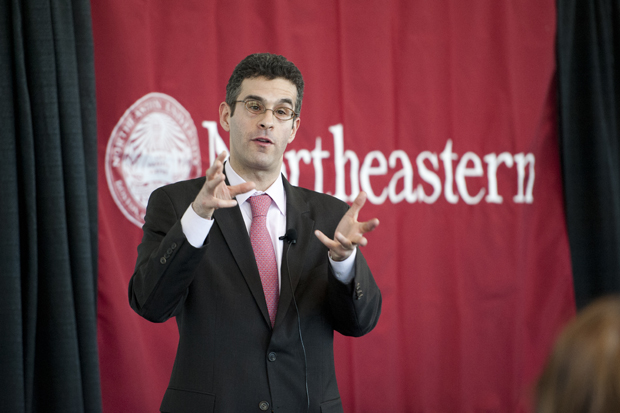Why the innocent plead guilty

In the late 1980s, Chris Ochoa was coerced into confessing to the rape and murder of the manager of a Pizza Hut restaurant in Austin, Texas.
The police threatened Ochoa with the death penalty during the interrogation, according to law professor Daniel Medwed, and even pointed to the vein in his arm in which prison officials would administer the lethal injection.
Frightened by these tactics, Ochoa pleaded guilty and received a life sentence. But after languishing in prison for more than a decade, he was exonerated by DNA evidence.
“Barriers to information can lead the innocent to plead guilty because of a misimpression that the government’s case is much stronger than it actually is,” Medwed told a rapt audience in the Raytheon Amphitheater on Thursday afternoon for the 49th annual Robert D. Klein Lecture. “Many innocent defendants have less information about the case against them than the guilty.”
Medwed is a nationally known expert in criminal law and a leading scholar in the field of wrongful convictions. His recent book on the topic—Prosecution Complex: America’s Race to Convict and Its Impact on the Innocent—has received critical acclaim from the likes of New York Times best-selling author John Grisham.
Over the course of his hourlong lecture, Medwed laid out a convincing case for why innocent defendants plead guilty and well-meaning prosecutors make decisions that contribute to wrongful convictions.
He quickly dismissed the notion of prosecutor as “minister of justice,” citing the difficulty of simultaneously advocating for fairness and justice for all and representing the state in charging and litigating cases against suspected criminals.
“This minister of justice image is frequently a mirage,” he said. “Juggling the dual obligation is difficult and all too often the role of zealous advocacy triumphs.”
But why is this the case? According to Medwed, the inherent challenge in reconciling these roles is exacerbated by three factors: cognitive psychology, professional incentives, and political considerations.
Take, for example, cognitive psychology. Cognitive psychologists, Medwed explained, have long posited that humans are susceptible to a tendency known as “confirmation bias,” in which they develop a theory and then cling to it even in the face of countervailing information.
Prosecutors are particularly susceptible. “Once their theory of guilt is validated by a jury verdict of guilt, they tend to become extremely vested in that outcome afterward,” Medwed explained. “Later on, if they are presented with a post-conviction claim of innocence, they usually dig in their heals, displaying what psychologists call aversion to cognitive dissonance.”
Medwed closed his lecture by examining four proposals for reform of the plea-bargain process: abolition; trial tax reform; increased pre-plea disclosure; and judicial monitoring.
He rejected the idea of abolishing plea-bargaining, saying, “The criminal justice system would grind to a halt without a financial commitment of epic proportions to boost the supply of court personnel and facilities to meet the soaring demands for trials.
“And let’s not lose sight of the reality that most criminal defendants are guilty,” he added.
Nevertheless, Medwed remains optimistic that prosecutors may one day live up to the exalted title of ministers of justice. “I believe in evolution, not revolution,” he explained, “and a handful of targeted, well-placed reforms could help prosecutors realize this ideal.”
Following Medwed’s lecture, Stephen W. Director, provost and senior vice president for academic affairs, presented him with the Klein Lectureship medal. The University Lectureship was established in 1964 and in 1979 was renamed in tribute to the late Robert D. Klein, professor of mathematics, chairman of the Faculty Senate Agenda Committee, and vice chairman of the Faculty Senate.
“I feel like I just won the nerd Olympics,” Medwed said.





